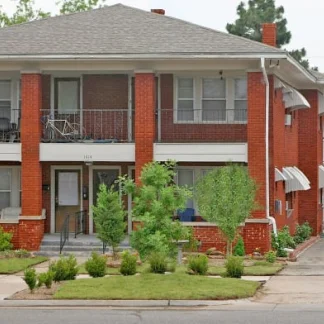Able Recovery
Able Recovery is an outpatient addiction treatment center that can be found in O...
Into Action Sober Living is a sober living rehab center for men in Oklahoma City, OK. It offers a supportive and structured environment to men who are recovering from substance use disorders and addictions.
Rooted in the 12-Step philosophy, Into Action Sober Living offers various treatment services including:
Into Action Sober Living offers a Sober Living Program tailored explicitly for men. This program focuses on long-term recovery and integrates peer support within a community-oriented setting. Residents engage in 12-step programs, community meetings, and daily routines to reinforce sobriety and life skills.
Recognizing the importance of economic stability in long-term recovery, Into Action provides support for employment opportunities. This includes resume building, job search assistance, and fostering a work ethic that helps residents reintegrate into the workforce.
The program emphasizes the importance of family involvement in the recovery process. Through family consultations and updates, loved ones are kept in the loop, ensuring a supportive network that contributes to the resident’s overall well-being.
In addition to its core services, Into Action Sober Living also guides residents in accessing various community resources. These can range from medical services and counseling to educational opportunities, aiding in the holistic recovery of the individual.
Contact us for more information: (405) 757-7671

Connect with Into Action Sober Living by calling their admissions team directly.
(405) 757-7671 Website Get DirectionsGroup therapy is any therapeutic work that happens in a group (not one-on-one). There are a number of different group therapy modalities, including support groups, experiential therapy, psycho-education, and more. Group therapy involves treatment as well as processing interaction between group members.
Life skills trainings involve all the skills a person must have in order to function successfully in the world. These include time management, career guidance, money management, and effective communication. Truly successful addiction recovery is based on the ability to not only live substance-free, but to thrive. Life skills teaches the practical necessities of functioning in society, which sets clients up for success in life, and therefore sobriety.
Recreational therapy (aka therapeutic recreation) uses creative and fun activities to help with addiction recovery. Recreational therapists lead patients in entertaining and engaging activities like sports or games; art (drawing, painting, sculpture); drama, music, and dance; and/or community outings (field trips) to improve patients' physical, social, and emotional well-being.
Life skills trainings involve all the skills a person must have in order to function successfully in the world. These include time management, career guidance, money management, and effective communication. Truly successful addiction recovery is based on the ability to not only live substance-free, but to thrive. Life skills teaches the practical necessities of functioning in society, which sets clients up for success in life, and therefore sobriety.
Recreational therapy (aka therapeutic recreation) uses creative and fun activities to help with addiction recovery. Recreational therapists lead patients in entertaining and engaging activities like sports or games; art (drawing, painting, sculpture); drama, music, and dance; and/or community outings (field trips) to improve patients' physical, social, and emotional well-being.
Recreational therapy (aka therapeutic recreation) uses creative and fun activities to help with addiction recovery. Recreational therapists lead patients in entertaining and engaging activities like sports or games; art (drawing, painting, sculpture); drama, music, and dance; and/or community outings (field trips) to improve patients' physical, social, and emotional well-being.
Able Recovery is an outpatient addiction treatment center that can be found in O...
City Rescue Mission, located in Oklahoma City, Oklahoma, provides direct service...
New Beginnings Counseling Services is a private rehab located in Oklahoma City, ...
Oklahoma City VA Health Care System - VA Medical Center is a public rehab locate...